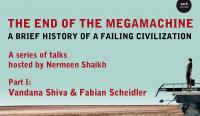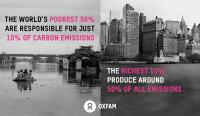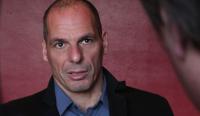According to Noam Chomsky, the state basically dictates the structure of the market. Corporations also receive privileged rights from the state. However, the neoliberal turnaround has profoundly changed these structures. Since the 1980s, around 1000 billion dollars have been stolen from the working and middle classes every year through changes in tax and corporate law. State capitalism can take on very different forms. As the climate crisis must be solved in the next ten to twenty years, this is only possible within the framework of a reformed state capitalism. However, a fundamental system change remains necessary, but requires more time. Chomsky advocates an ambitious Green New Deal, as he outlined with Robert Pollin in the book of the same name. "If we reach a warming of 3 or 4 degrees Celsius, we are probably finished. No organized human life will survive at that level." Governments should buy up the oil, gas and coal industries, hand them over to the workforce and switch to renewable energies: "That is perfectly feasible tomorrow". However, even Joe Biden's inadequate Green New Deal plan was overturned by the Clinton wing of the Democratic Party. The climate crisis is a class conflict of "colossal proportions" and the climate movement is facing enormous challenges. The fight should not be left to young people and indigenous communities alone; people with power and prestige must join in.
Noam Chomsky, linguist and author of more than 100 books, University of Arizona
Fabian Scheidler, co-founder of Kontext TV, author of "The End of the Megamachine. A Brief History of a Failing Civilization"
Moderated by Nermeen Shaikh, co-host of Democracynow
Nermeen Shaikh: Professor Chomsky, your thoughts on this. You've termed the present order “neoliberal plague”. And this question of the fallacy of free markets, what Fabian has said about the relationship between states and markets.
Noam Chomsky: The states structure the market, they structure corporate governance, they structure the nature of the market within the system that they structure. There's an element of free market interchange and operation but within the framework that governments establish. So for example what I mentioned about intellectual property rights is radically opposed to free markets and grants effectively monopoly pricing rights to major corporations. The same is true internal to corporate governance. Remember corporations are set up by the state. To incorporate is to get a gift from the state. When you incorporate the state is saying: okay, we grant you protection of limited liability. That goes back to the origin of corporations hundreds of years ago. So you're getting a gift from the state and in return the state determines the mode of corporate governance. Well the neoliberal plague was quite different from the period that preceded it. One of the changes that it instituted was changes in the rules of corporate governance. It allowed CEOs, heads of corporations, to pick the board that sets their remuneration. The remuneration is partly salary, partly stock options, all sorts of devices. But there's a board of directors that determines it. The new rules of governments have allowed the CEO to pick it. What do you think is going to happen from that? We'll see management remuneration has shut through the sky. One of the main factors in the huge inequality that's developed during the neoliberal period is simply the dragging of remuneration up for a tiny percentage of the population. CEOs, other managers, dragged up with them, university presidents, the whole system. Just to give you a picture of it: in the last 40 years, 0.1 percent of the population, not 1 percent but 0.1, its share of income has doubled from 10 percent of national wealth to 20 percent of national wealth. A recent study, which just came out a couple of weeks ago, from the Rand corporation, a very authoritative study, estimated how much the working class and middle class have been robbed by the neoliberal principles instituted in around 1980, which modified the rules radically, allowed tax havens, all sorts of things. What's the total cost to the working class and the middle class, what they call the lower 90 percent of the population? They estimated it at 47 trillion dollars, that's a trillion dollars a year stolen from the working class and the middle class just by the manipulations that created the neoliberal system. They have sharply reversed things. The period of regimented capitalism, roughly the Second World War up to the late 70s, was the greatest growth period in capitalist history. It's called the golden age of capitalism by economists and it was egalitarian growth, the lower quintile did actually a little better than the upper quintile. There were no financial crises because the banks and the financial institutions were under control. There were no tax havens, they were illegal, the treasure department enforced the law. It was no heaven by any means, all of the basic problems of capitalism that Fabian mentioned were there. But they're in a different form, just as they're there in a different form in social democratic Norway and radically neoliberal America. There are different varieties of state capitalism, it’s all state capitalism, but many different varieties. And when we're thinking about the immediate problems, the main problem we face, as Fabian pointed out, is the heating of the environment. If we do get to three or four degrees centigrade higher than pre-industrial levels we're probably finished. It's very hard to imagine that any form of organized human life will survive at that level. The main analysts call it cataclysmic. Now we are moving there, so we have to do something to change that. But the time scale for modifying that and the time scale for overcoming capitalism are very much out of line. Overcoming capitalism is a long project. The basis has to be established for it, in public consciousness, in alternative institutions of the kind that Fabian mentioned and so on. Dealing with the coming environmental catastrophe is a matter of the next decade or two. It's going to have to be done pretty much within the framework of state capitalist institutions. Fortunately these can be very much modified, very much like the Green New Deal. The version that was presented to congress is very vague and imprecise, but there are much more specific versions. One of them is worked out by in detail by economist Robert Pollin, my friend and co-author, our joint book on this has just come out yesterday. It is in fact a very detailed plan to how to move towards meeting the top goals of the climate analysts: reduction of emissions by about 50 percent within a decade, complete net zero emissions by 2050. You can meet that with feasible measures and methods all known to us, with literally a fraction of the state expenditures that were used to bail people out after the pandemic, way less than was used during the Second World War. It's all available, all possible, roughly within the framework of the general state capitalist institutions. But they have to be changed. Take, say, the fossil fuel industries right now. There is nothing to stop the government from buying them up, handing them over to the workforce, terminating the use of fossil fuels, shifting them to sustainable energy. It's not even a lot of money, given the low oil prices, that's perfectly feasible, that can be done tomorrow. It maintains state capitalism, but in a sharply different form. You can say this across the board. The careful Green New Deal proposals go into all of this in detail, also how to create better jobs, more jobs, including taking care of the people who will lose their jobs under transition to a sustainable economy. A lot of this has been worked out in great detail in the major Green New Deal proposals, the one from Robert Pollin is one, Jeffrey Sachs uses somewhat similar models and comes out with similar results. It's all in our hands. The problems, the deep problems of capitalism will remain, they have to be overcome, but in a longer time range and by other methods like the ones that Fabian mentioned. The self-managed industries for example, which are proliferating, cooperatives, localism in food production. Many means can be pursued to try to erode, to undermine, to destroy the long-standing system. But we have immediate problems to face. Those refugees fleeing from Bangladesh are not in the far future. Just a couple of months ago, there was a cyclone of unprecedented proportions, one of the predicted effects of global warming, in East Bengal, West Bengal and Bangladesh. A large part of Bangladesh was under water. That was one cyclone. It's gonna keep coming. Sea levels are rising. What's called the refugee problem today – which is in fact as pope Francis put it a moral crisis of the West not a refugee crisis – that's going to expand enormously very soon. We have to deal with that within pretty much existing institutions. Time scales allow us nothing else, so we have to bear that in mind. There is also a lot of things to say about the enlightenment in modern history, but here is not the time to go into.
Nermeen Shaikh: Professor Chomsky, as we wrap up, could you elaborate a little bit on the climate crisis, which is not only imminent but in fact present and only likely to accelerate. Do you see any kind of political will, and if so where, to institute the kinds of changes that that you're talking about? And what role do you think global climate activism led by young people can play, what significance and influence that might have.
Noam Chomsky: It's very significant, if you look at this international class conflict that's taking place, symbolized by the reactionary international in the White House and the Progressive International that just met last weekend. It's based on large popular movements and popular forces. So let's take the climate activism that's been led by basically two groups. One is young people, whose spokesperson in many ways, Greta Thunberg, captured it in one phrase: “you are betraying us”. That's right, it's talking to us. You are betraying us. It's being led by young people. There's another group leading it: indigenous people. They've been in the forefront of trying to deal with the climate catastrophe for years, First Nations in the Western hemisphere, indigenous people in South America, all over the world, and tribal people in India. They've been working hard to try to construct what they have lived with for tens of thousands of years: a relation with the environment that is sustaining. They've been bitterly attacked in the Amazon region of Brazil, they are facing literal destruction. These two groups have been struggling to save us from our follies. Take say the Green New Deal, one or another form of it is essential for survival. A couple of years ago in the United States it was way out at the margins, just ridiculed. Now it is on the legislative agenda. That's the result of work by young people, a lot of activists, a small group, the sunrise movement, young activists who went to the extent of occupying congressional offices. They got the support of Alexandria Ocasio-Cortez, one of the young people who came into congress on the Bernie Sanders wave. Ed Markey, senior senator from Massachusetts, has been interested in environmental issues for all his life. They managed to put it on the legislative agenda. Now comes a battle: can you implement it? And of course the republicans don't even talk about that, they want to just destroy it totally. But within the Democratic Party there's a conflict developing. It's very interesting to watch it. The activists and the people from the Sanders campaign did succeed in getting the Biden campaign to put a reasonably decent, not wonderful but reasonably decent climate proposal in the in their program. The Democratic National Committee, the Clintonites, the donor-oriented segment that runs the party, killed it. You can see it very dramatically. When you go back a month, in August, if you ran on Google “Democratic Party climate program” you got the mildly progressive Biden program. Click on it now, you get how to donate to the Democratic Party. It's gone. I’m not part of the inner workings, so I don't know in detail how this was managed, but you can guess. It seems pretty clear that the Clintonite managers killed it. That's going to be a battle that's going on even if Biden is elected. His program was nowhere near good enough, but the DNC program means: do nothing. And there's where the activists have to make their move. They did succeed in pushing something forward but a lot more has to be done. And it is simply a tragic betrayal to leave this in the hands of young people and indigenous populations. They're not the ones who should be leading it, it's the ones with power, prestige, some degree of stability in their lives and professions, they should be leading. And that has to be fast, it can't wait 200 years, it's going to have to be in the next couple of decades. The disasters may come in 100 years or 200 years, but the sources of it have to be dealt with now. In fact, the disaster doesn't come like that, it grows, you see bits and pieces of it every year. I see it out the window where I’m sitting where I haven't seen a blue sky in Arizona for weeks because of the smoke coming from California, which is on fire. That's coming now, it's not a catastrophe not to see a blue sky, but a sign of what's coming in a much harsher way. And it will hit most harshly the people who are not responsible for it, young people, poor people in Africa, than elsewhere. If you look at CO2 emissions, which are destroying the possibility for organized human life on Earth, overwhelmingly they come from the rich countries and within the rich countries they come from the rich, not the poor. So this is a class problem on a colossal scale, and we have to recognize that and deal with it rapidly and decisively.





